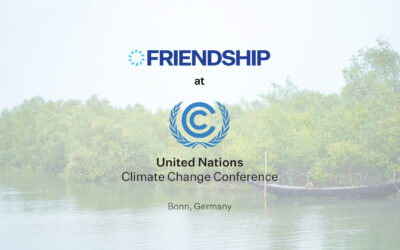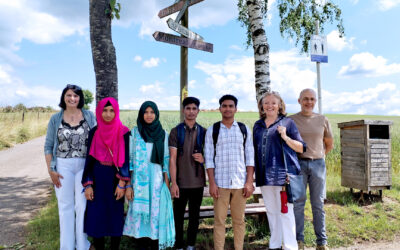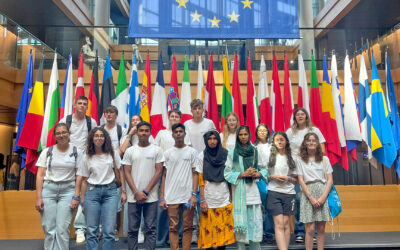- External review finds Friendship Education Program to be replicable globally
- Code of Ethics component to provide inspiration for national curriculum review
- Education Minister invites Friendship to replicate its schools in her constituency
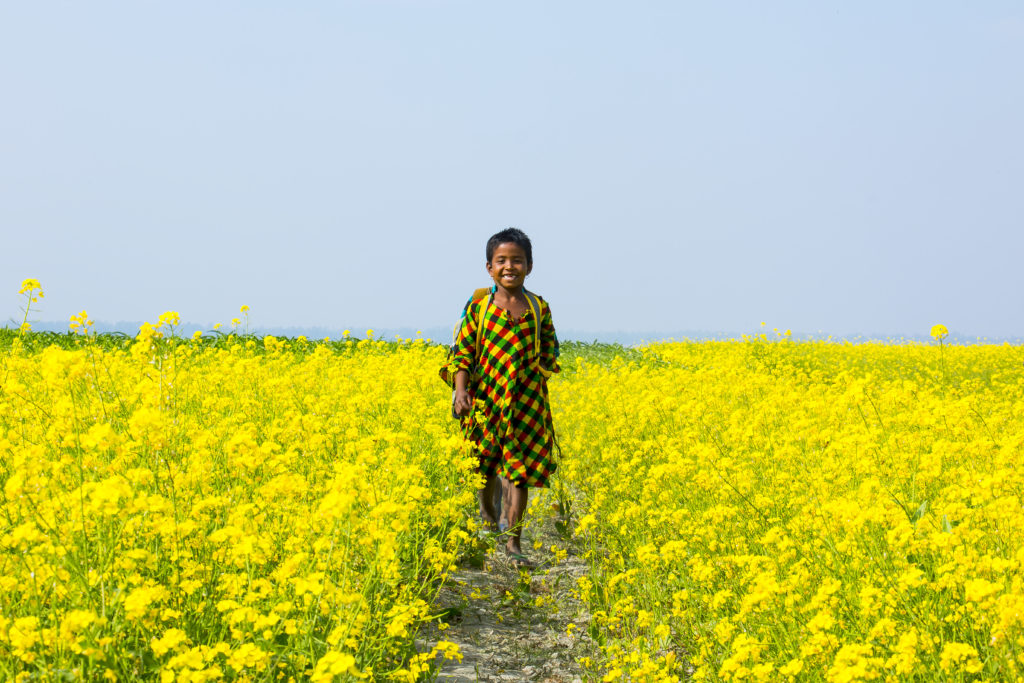
After running primary and secondary education for over a decade in the northern riverine islands of Bangladesh, Friendship initiated an independent evaluation end 2019 to ascertain the quality, effectiveness and impact of the programs on the communities in which we intervened. The evaluation was carried out by the Institute of Education and Research (IER) of the University of Dhaka, with the support of Friendship Luxembourg. IER carried out an exhaustive research through both qualitative and quantitative methods and submitted a comprehensive report in October 2020.
Friendship organised an international webinar to share the results of the evaluation on November 19, 2020. The webinar, titled Friendship Education Programme: Nurturing Values and Empowering Communities, was attended by 175 guests online from six countries and witnessed by 1700 viewers on Facebook Live. Dr. Dipu Moni, MP and Minister, Ministry of Education, People’s Republic of Bangladesh attended the webinar as the chief guest. Mia Seppo, the United Nations resident coordinator in Bangladesh, joined the program as the special guest. The IER team presented the keynote paper and six distinguished government high officials and academics from home and abroad participated in the discussion as guest panellists. Guest participants included government officials of concerned ministries, academics, international donors, chairs and members of Friendship Luxembourg, Friendship France, Friendship Belgium, Friendship Netherlands, Friendship UK, executive members of Friendship Board and members of Friendship. Brig Gen Ilyas Iftekhar Rasul, Friendship’s head of Education moderated the session. A summary of the evaluation report with key findings and salient recommendations was circulated to the attendants prior to the webinar.
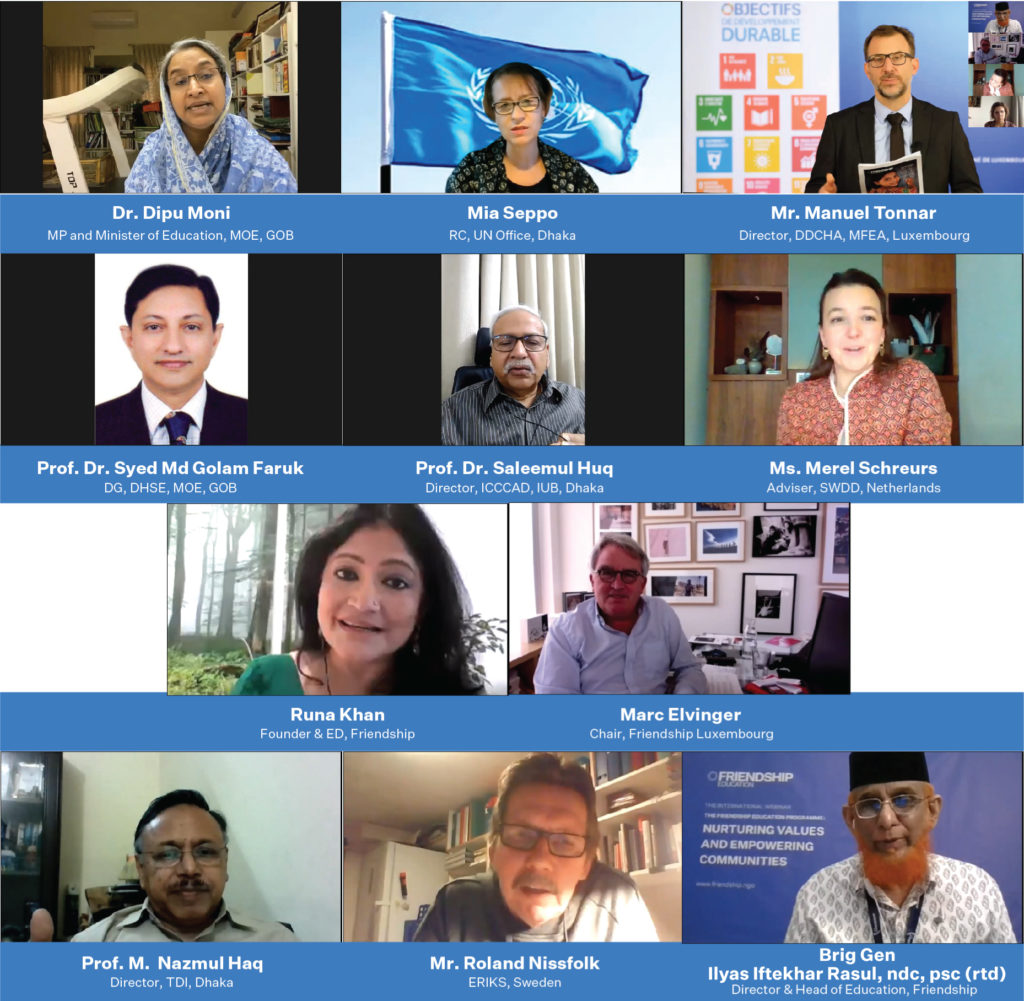
An Overview of the Friendship Education Program
Friendship has four commitments to its beneficiaries—Saving Lives, Poverty Alleviation, Climate Adaptation and Empowerment—which are ensured through the holistic services in six sectors including Education. With a goal to make quality education accessible even in remote and hard to reach areas, especially for the char communities, Friendship started its primary education program in 2006 and secondary education program in 2015. The intent was to reach out to those children and adults who otherwise would not have learned to read and write. Currently, Friendship is running 43 Primary Schools, 17 Secondary Schools and 49 Adult Learning Centres with 4,296 students and 980 learners respectively in remote hard to reach riverine chars of River Brahmaputra in the districts of Gaibandha and Kurigram.
In the last decade and a half, Friendship has been able to sensitize these char communities to the value of education. Most of the eligible students in the area now have access to quality education resulting in a recognizable wider impact in the society. Friendship schools not only cover government curriculum, but also include value-based co-curricular and extra-curricular activities as core components of the program to help students develop as better human beings and worthy citizens.
Webinar Proceedings
The program included an opening address, a keynote presentation, guest panellists’ discussion on the report, and a discussion and addresses by the special and chief guests. In her opening address, Runa Khan, founder and executive director of Friendship shared her thoughts and philosophy behind imparting education to char communities. She recalled that back in 2006, access to education was a far cry in the northern chars but now she feels happy that they have access to quality and value-based education and raising their hopes and aspirations. She lauded IER for an in-depth report confirming the successes and strengths of Friendship Education Program (FEP). She also committed to consolidating the gains achieved as well as addressing various recommendations made by IER in strengthening the education sector, as a whole. She also expressed her intention to open Friendship University with morality and ethics as core components of all programmes.
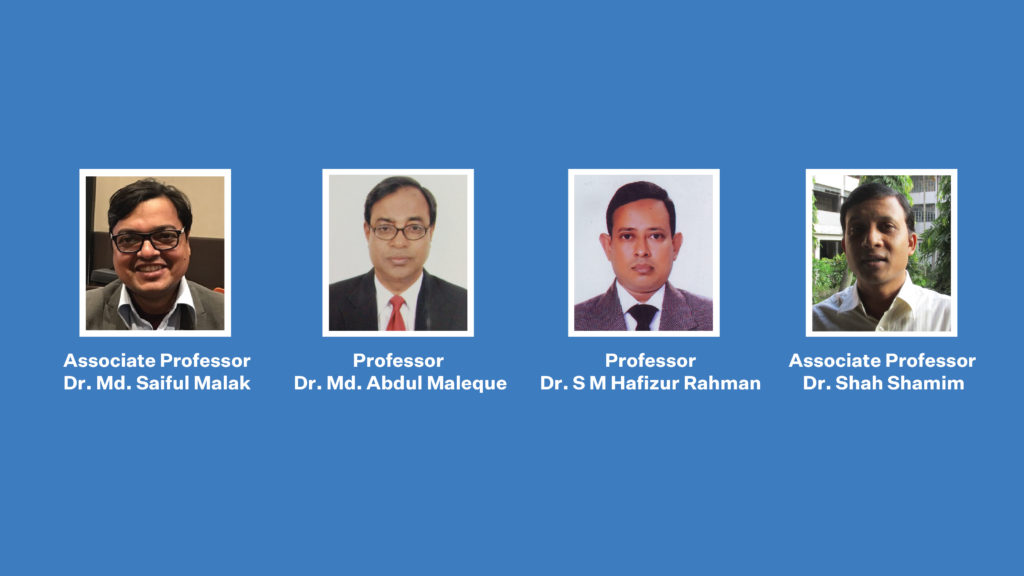
Professor Dr. Md. Abdul Maleque, (director, IER, DU) and Associate Professor Dr. Shah Shamim Ahmed, presented the keynote paper on behalf of the IER team. The professors in their presentations highlighted the purposes and objectives of the evaluation, discussed the methodology of their research, pointed out the key areas making positive impacts, identified key areas requiring improvement and also indicated key opportunities FEP has created. According to the evaluation team, positive impact areas include the students’ learning achievement, code of ethics practices, remote teaching (ICT based), strong monitoring mechanism, empowerment of children and women, impact on wider communities, encouraging future outlook and impact on other education actors. However, the team identified few areas to improve which include classroom learning environment, teachers’ pedagogical beliefs and efficacy and aspects of the monitoring mechanism. The IER team identified certain opportunities to add value to the programme including integration of Technical and Vocational Education (TVE), vertical and horizontal extension of educational access, scaling up of the Code of Ethics component, and the Friendship model of operating schools in char areas.
Six distinguished guest panellists spoke and made their observations on the evaluation report as well as on the keynote presentation. All of them acknowledged that FEP is a successful value-added program and a model worth replicating.
Professor Dr. Syed Md. Golam Faruk, director general, Directorate of Secondary and Higher Education (DHSE), Ministry of Education (MOE), Bangladesh, appreciated the practice of ethical values in Friendship schools and in the communities. He also informed that MOE is currently reviewing school’s curriculum where learnings on values and positive attitude is actively considered. He stated that his directorate would be happy to draw FEP lessons on code of ethics practices in their curriculum revision.
Manuel Tonnar, director of the Directorate of Development, Cooperation and Humanitarian Action (DDCHA), Ministry of Foreign and European Affairs (MFEA), Luxembourg, highlighted the importance of quality and value-based education and congratulated FEP for providing the same to the disadvantaged communities. He also noted with optimism the suggestion to replicate FEP’s model and assured his Ministry’s support for the fulfilment of the report’s recommendations.
Professor Nazmul Haq, director, Teachers Development Institute, Dhaka, critically analysed the report questioning some of its methodology specially on the measuring scale, fairness of comparison with government schools, timeline of an impact study, etc. All these issues were clarified by the IER team during open discussion. Professor Nazmul acknowledged that FEP in the remote chars is a challenging task and commented that “though the number of Friendship schools is not high, their achievements are big.” He also suggested strengthening blended education, i.e., physical and online or remote learning, in the backdrop of the current pandemic situation.
Roland Nissfolk of ERIKS Development Partners of Sweden informed that his organization is pleased to have been associated with FEP since its inception and noted with satisfaction that FEP is causing positive social changes in the communities, e.g., reducing early marriages, application of the code of ethics both at school and home, raising hopes for the future, etc. He reaffirmed the support of ERIKS to the implementation of the evaluation report’s recommendations.
Merel Schreurs, advisor of Stichting Weeshuis der Doopsgezinden (SWDD) of Netherlands appreciated FEP’s role in bringing a systemic change in the working communities and agreed with the report’s finding that the model is now replicable. She said that her organization was aware of FEP’s positive contribution and conveyed her happiness that the evaluation report has confirmed its positive outcome. However, she also raised a few observations similar to Professor’s Nazmul’s view especially on the validity of a comparison with public institutions, given the variance in cost and personnel. She also suggested to make education in Bangladesh more inclusive.
Professor Dr. Saleemul Huq, director of the International Centre for Climate Change and Development (ICCCAD), at the Independent University Bangladesh (IUB) while commenting on the findings of the report suggested that Friendship should build on its achievements and share it with others. Being a climate change expert, he remarked that climate change is an overarching issue nowadays and climate action should be included in school curricula. He offered his service in revising FEP curriculum to include climate issues.
Mia Seppo, UN’sresident coordinator in Bangladesh stated that SDG 4 (quality education) is a multiplier of all other SDGs. She further commented that global citizens, besides being educated should also be equipped with values and she was happy to note that Friendship schools are nurturing the same. Referring to current pandemic situation vis-à-vis schools’ closure for longer period, she expressed her concern that there may be many dropouts and overall, and that it may cause a serious knowledge gap for this generation of students. She appreciated the evaluation report and invited Friendship to get involved with the ongoing dialogue of getting students back into school.
Dr. Dipu Moni, MP and Minister of Education of Bangladesh, in her address as the chief guest lauded Friendship for its remarkable role in providing quality education to the disadvantaged communities in char areas. She also expressed her happiness to know the details of the FEP through the assessment report. She opined that best practices nurtured by Friendship schools are equally applicable for all schools. Supporting the DG, DHSE she informed that her Ministry is reviewing the school’s curriculum for the inclusion of value teachings and opined that Friendships best practices may add value to this revision. She also thanked international development partners for their support. Acknowledging the replicability of FEP, she invited Friendship to raise similar schools in 13 chars of River Meghna which fall in her constituency.
Marc Elvinger, chairperson of Friendship Luxembourg and co-chair of Friendship International emphasised in his closing remarks the importance of sharing FEP’s successes and best practices for wider use through replication. He requested Friendship to review the findings and recommendations of the report in order to strengthen FEP. He then closed the session by thanking distinguished guests, participants, the IER team and all personnel involved with FEP.
Lessons Drawn
- FEP is recognized as a model of education which is replicable. The Minister of Education has invited Friendship to replicate it in the chars of River Meghna, one of the major rivers in Bangladesh.
- Revision of school’s curriculum into value-based learnings through incorporation of morality and ethics as core components is essential to make students worthy human beings and citizens. In this respect, it was recommended to share Friendship school’s practices and experiences on code of ethics with the government’s ongoing initiative on the revision of school’s curriculum.
- SDG 4 (quality education) is a value multiplier to all other SDGs and hence should be given highest priority. FEP has established this fact by bringing a very positive impact in the wider communities.
- Future education should blend physical and online schooling.
- School curricula should include lessons on climate actions as climate change has become an over-arching global issue.

